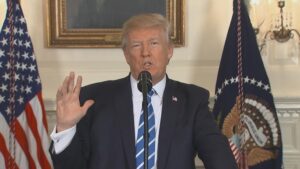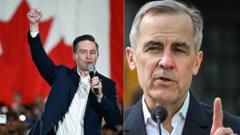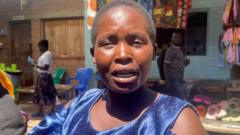The recent suspension of USAID funding has created a crisis in healthcare across Africa, particularly impacting those living with HIV in Uganda and Malawi. Patients, such as Mike Elvis Tusubira in Uganda, face severe hardships as they struggle to access life-saving anti-retroviral drugs and preventive medications. In Uganda, the sudden halt in aid has led to the disarray of critical health programs that have supported countless families, leaving many without essential services. Similarly, in Malawi, the fallout from the funding freeze threatens to undo years of progress made against HIV and AIDS, raising concerns over the future of health initiatives in these vulnerable communities.
Impact of USAID Funding Freeze: Lives on the Line in Uganda and Malawi

Impact of USAID Funding Freeze: Lives on the Line in Uganda and Malawi
The freeze on USAID funding has left countless lives hanging in the balance, especially in Uganda and Malawi, as vital health services are disrupted.
The effects of the USAID freeze are deeply felt across Africa's health sector, especially in countries like Uganda and Malawi, where reliance on foreign aid is high. Mike Elvis Tusubira from Uganda explains that the cessation of life-saving medications due to aid cuts has made maintaining his marriage and managing his own health an ordeal. Without access to anti-retrovirals (ARVs) and HIV prevention drugs like PrEP, he fears the loss of his wife, who is HIV-negative, as their ability to engage in safe intimacy is jeopardized.
The 90-day funding pause, enacted by former U.S. President Donald Trump on his first day back in office, has led to immediate and devastating impacts on healthcare systems reliant on USAID support. For Tusubira, the situation has become desperate. His access to vital medicines has been cut off thanks to the closure of the Marpi Clinic in Kampala, where he previously received treatment. He shared his sense of helplessness with the BBC, stating, "I'm moving in the dark... I don't know whether my viral load is suppressed. I'm traumatised."
In Malawi, the consequences are equally severe, with various health clinics shuttered and workers left in limbo due to funding uncertainties. Eddah Simfukwe Banda, a farmer reliant on ARVs, expressed her sorrow and concern for her family's health as she noted, "We have to pray as Malawians. Those of us that believe depend on a God who opens doors when one is closed." She likened the reality of the situation to a harsh lesson about the dangers of excessive dependence on foreign aid.
Healthcare professionals in both countries are now grappling with the aftermath of the aid suspension. Programs that once provided essential services for HIV/AIDS care, tuberculosis, maternal health, and children's welfare have been left stagnant. Dr. Shamirah Nakitto from Uganda described the abrupt stop of operations as "so abrupt," highlighting how unprepared many were for the fallout.
As the ripple effect of the USAID funding freeze continues to unfold, health experts warn that the situation could worsen. With HIV treatment disrupted, the possibility of rising infection rates and preventable deaths looms large. Winnie Byanyima, head of UNAIDS, cautioned that if the aid is not restored, the impending health crisis could result in millions more AIDS-related deaths.
Across various regions of Africa, the reliance on USAID funding looms ever larger in stark reality, as the halt signifies not just a loss of medicines, but also interrupted hopes and futures for countless individuals battling HIV.
With only a month’s supply left of ARVs, Tusubira contemplates a grim choice. "If I die, they just bury me there," he said about returning to his village as he feels like he has no other choice left. The unfolding healthcare crisis continues to illustrate the dire consequences of foreign aid dependency, where vital services hang in the balance and citizens' lives are at stake in Uganda, Malawi, and beyond.
The 90-day funding pause, enacted by former U.S. President Donald Trump on his first day back in office, has led to immediate and devastating impacts on healthcare systems reliant on USAID support. For Tusubira, the situation has become desperate. His access to vital medicines has been cut off thanks to the closure of the Marpi Clinic in Kampala, where he previously received treatment. He shared his sense of helplessness with the BBC, stating, "I'm moving in the dark... I don't know whether my viral load is suppressed. I'm traumatised."
In Malawi, the consequences are equally severe, with various health clinics shuttered and workers left in limbo due to funding uncertainties. Eddah Simfukwe Banda, a farmer reliant on ARVs, expressed her sorrow and concern for her family's health as she noted, "We have to pray as Malawians. Those of us that believe depend on a God who opens doors when one is closed." She likened the reality of the situation to a harsh lesson about the dangers of excessive dependence on foreign aid.
Healthcare professionals in both countries are now grappling with the aftermath of the aid suspension. Programs that once provided essential services for HIV/AIDS care, tuberculosis, maternal health, and children's welfare have been left stagnant. Dr. Shamirah Nakitto from Uganda described the abrupt stop of operations as "so abrupt," highlighting how unprepared many were for the fallout.
As the ripple effect of the USAID funding freeze continues to unfold, health experts warn that the situation could worsen. With HIV treatment disrupted, the possibility of rising infection rates and preventable deaths looms large. Winnie Byanyima, head of UNAIDS, cautioned that if the aid is not restored, the impending health crisis could result in millions more AIDS-related deaths.
Across various regions of Africa, the reliance on USAID funding looms ever larger in stark reality, as the halt signifies not just a loss of medicines, but also interrupted hopes and futures for countless individuals battling HIV.
With only a month’s supply left of ARVs, Tusubira contemplates a grim choice. "If I die, they just bury me there," he said about returning to his village as he feels like he has no other choice left. The unfolding healthcare crisis continues to illustrate the dire consequences of foreign aid dependency, where vital services hang in the balance and citizens' lives are at stake in Uganda, Malawi, and beyond.



















